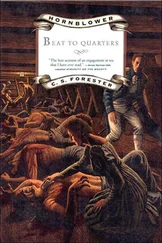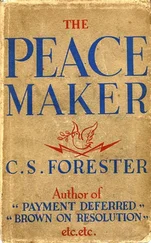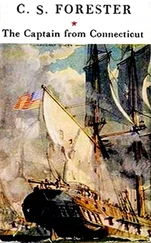So Macdonald had not risked French lives in this highly dangerous venture; that was to be expected, of course. Bonaparte had made war largely at the expense of his allies for the last ten years.
“I will see that you are given refreshment,” said Hornblower, politely. “Please order your men to sit down against the rail there.”
The officer barked the order. It was significant how at the first warning ‘achtung’ the dispirited soldiers came instantly to attention, standing stiff and straight. Most of them were wet and bedraggled, apparently having been in the water before surrendering. Hornblower gave orders for them to be fed, at the same time as the other boats came back downwind, each with its quota of prisoners. On the cramped decks of the Raven the two hundred prisoners made a fine show; Cole had the two foremost chase-guns run inboard and trained round upon them, a round of canister in each gun, the gun-captains posted with lighted matches ready to fire into them. Seamen, still grinning, went along their ranks handing out bread and beer.
“See how they eat, sir!” said Purvis. “Look at that one, layin’ into his biscuit like a wolf with a bone. God damme, it’s gone a’ready. It’s true what they say, sir, about Boney never feeding his men.”
An Imperial army was wont to gather its food from the countryside as it marched; Macdonald’s sixty thousand had been stationary now for over two weeks, and in a thinly populated country. They must be on short commons. Every day the siege of Riga could be prolonged cost lives in plenty to Bonaparte, and although he was ever prodigal with lives there must come a time at last when he would have no more to spare, not even Prussian ones, or Italian ones. The greater the pity, then, that the whole division that had tried to pass the river had not been wiped out. Hornblower told himself that was his fault; he should not have entrusted any vital part of the operation to a nervous old woman like Cole. He ought instead to have stayed on board Raven himself. Yet it was hard to be sure of that; the other end of the line, which he had entrusted to Vickery in Lotus, was just as important, and it was desirable that he should be in the centre in Nonsuch to coordinate the activities of his two wings. If Vickery and Cole had had their positions interchanged—as would have to be done—although Vickery could have been relied upon not to spring the trap too soon, could Cole have been relied upon to keep it closed? There might be five thousand Prussians on the farther bank of the Dwina at this moment if it had been up to Cole to head them off. Hornblower found himself wishing that he had known exactly which night Macdonald would make the attempt; he might as well have wished for the moon.
“Mr. Cole,” said Hornblower, “make a signal to Nonsuch, ‘ Commodore to Captain. Am proceeding to Riga with prisoners’. Then the guard-boats can return to their respective ships, and if you’ll kindly up anchor we’ll start.”
Hornblower was once more up in the gallery that encircled the dome of the church of Daugavgriva.
“You see what I was telling you about, sir,” said Clausewitz, pointing.
Out beyond the Russian works stretched a long line, brown against the green, the parapet of the trench the French had thrown up during the night. Macdonald must be a general with energy, for he had had this work done at the same time as he had sent the Prussians on their risky endeavour to cross the river, so that while one attempt had failed he had made a solid gain, profiting by the dark and rainy night to throw up this entrenchment far forward unobserved.
“That is his first parallel, sir, and in the centre of it is the battery he is constructing. And see there, sir? That is where he is sapping forward.”
Hornblower stared through his telescope. At a point towards the end of the face of the first parallel he could see something that looked like a wall constructed of bundles of timber. The guns in the Russian works far below him were firing at it; he could see earth flying as the shots struck round it. At the end of the wall of timber was something that looked strange—a sort of shield on wheels. He was studying it when he saw it moved out suddenly, leaving a narrow gap between it and the end of the timber wall, in which for a fleeting moment he saw a couple of men in blue uniforms. It was only a fleeting moment, for immediately the gap was filled with a new bundle of timber. Above the new bundle he could see the blades of spades rising and then disappearing; apparently the bundle of timber was hollow, barrel-shaped, and as soon as it was in position the men sheltering behind it set to work to fill it up with earth dug from behind it. Hornblower realized that he was witnessing the classic method of sapping towards an enemy’s position with ‘gabion’ and ‘fascine’. That big timber basket was a gabion, now being filled with earth. Farther back, under cover of the line of filled gabions, the besiegers were revetting their breastwork with fascines, six-foot bundles of wood, and farther back still they were building the whole thing solid with earth dug from a trench behind the breastwork. As he watched, the shield was suddenly pushed forward another yard, and another gabion was put in position; the French were three feet nearer the earthworks which guarded Daugavgriva. No, not a yard, a little less, because the sap was not pointing straight at its objective, but out at its flank so that it could not be enfiladed. Soon it would change its direction, and point towards the other flank, approaching the fortress in zigzag fashion, ruthlessly and remorsely. Of all operations of war a scientific siege was the most certain if relief did not arrive from the outside.
“See there, sir!” said Clausewitz suddenly.
From behind a high embankment had suddenly emerged a long string of horses, looking like ants at that distance, but the white breeches of the men who led them showed up clearly in the sunshine. The horses were dragging a cannon, a big piece of artillery when its apparent size was compared with that of the horses. It crawled towards the battery in the centre of the first parallel, a myriad white-breeched specks attending it. The high breastwork of the first parallel screened the operation from the sight of the Russian gunners and shielded it from their fire. When the guns had all been brought into the battery, Hornblower knew, openings—‘embrasures’—would be made in the breastwork through which the guns would open fire on the village, silencing the return fire of the defence, and then hammering a breach; meanwhile the sap would be expanded into a wide trench, the ‘second parallel’, from which, or if necessary from a ‘third parallel’, the stormers would rush out to carry the breach.
“They will have that battery armed by to-morrow,” said Clausewitz. “And look! There is another gabion put in place.”
Siege operations had the remorseless cold inevitability of the advance of a snake on a paralysed bird.
“Why do your guns not stop the work on the sap?” asked Hornblower.
“They are trying, as you see. But a single gabion is not an easy target to hit at this range, and it is only the end one which is vulnerable. And by the time the sap approaches within easy range their battery-fire will be silencing our guns.”
Another siege-gun had made its appearance from behind the high embankment, and was crawling towards the battery; its predecessor was at that moment being thrust finally into its position at the breastwork.
“Can you not bring your ships up, sir?” asked Clausewitz. “See how the water comes close to their works there. You could shoot them to pieces with your big guns.”
Hornblower shook his head; the same idea had already occurred to him, for the long glittering arm of the Gulf of Riga which reached into the land there was very tempting. But there was less than a fathom of water in it, and even his shallow bomb-ketches drew nine feet—seven at least if he emptied them of all their stores save those necessary for the action.
Читать дальше












